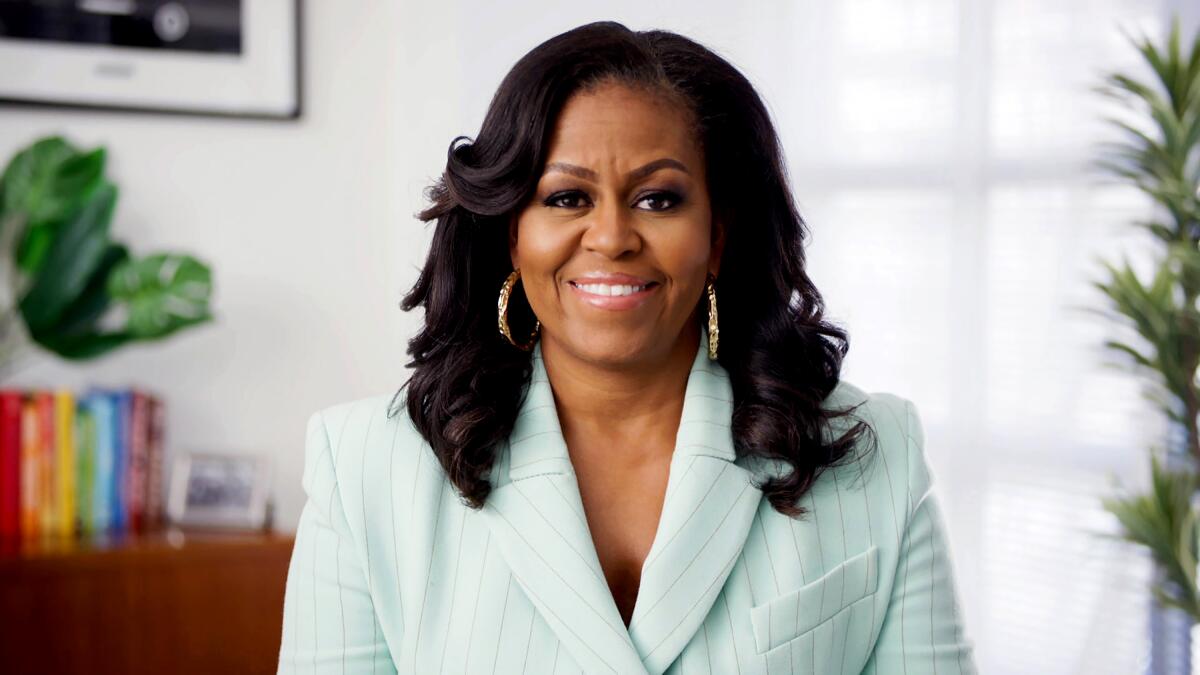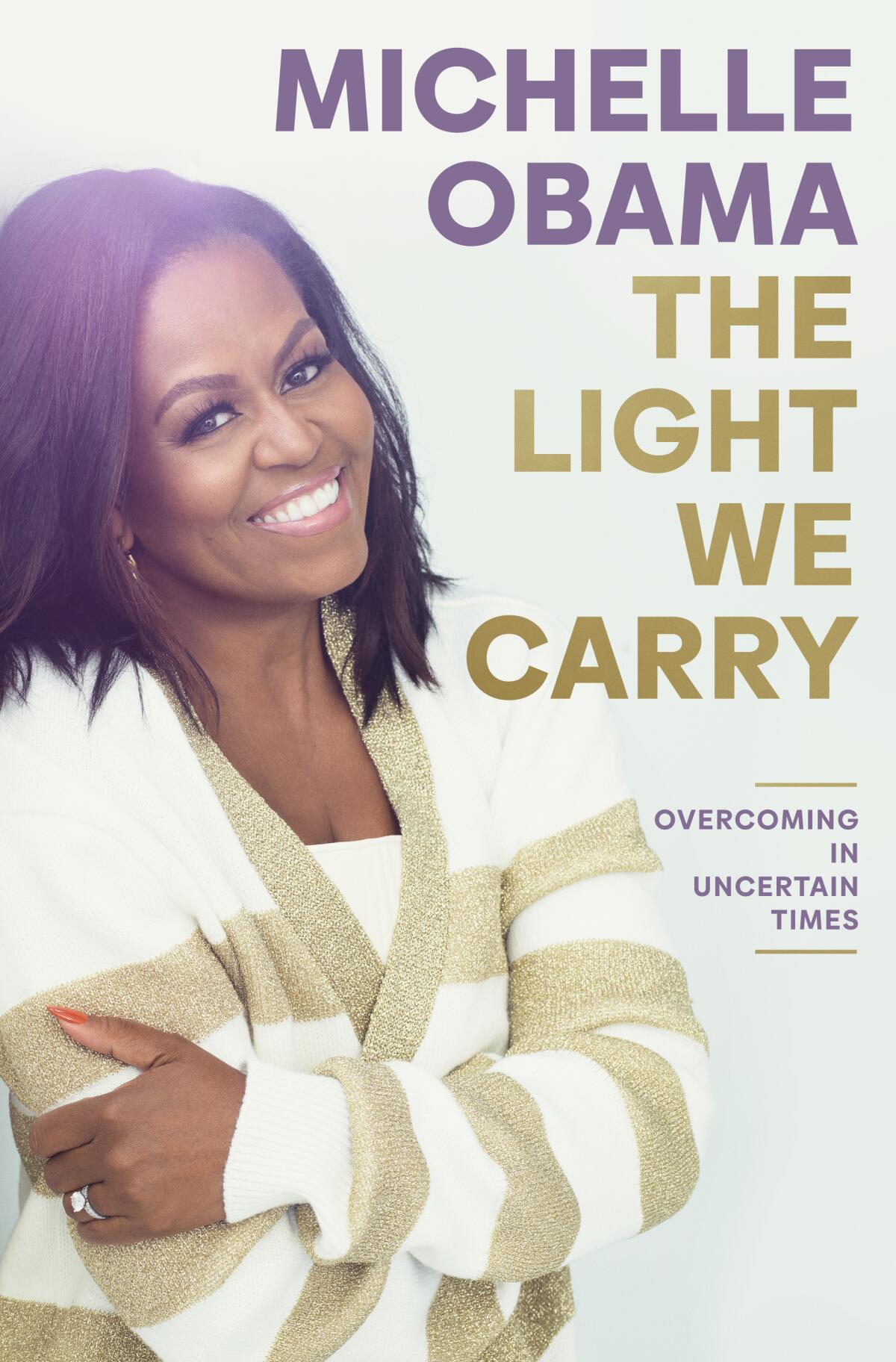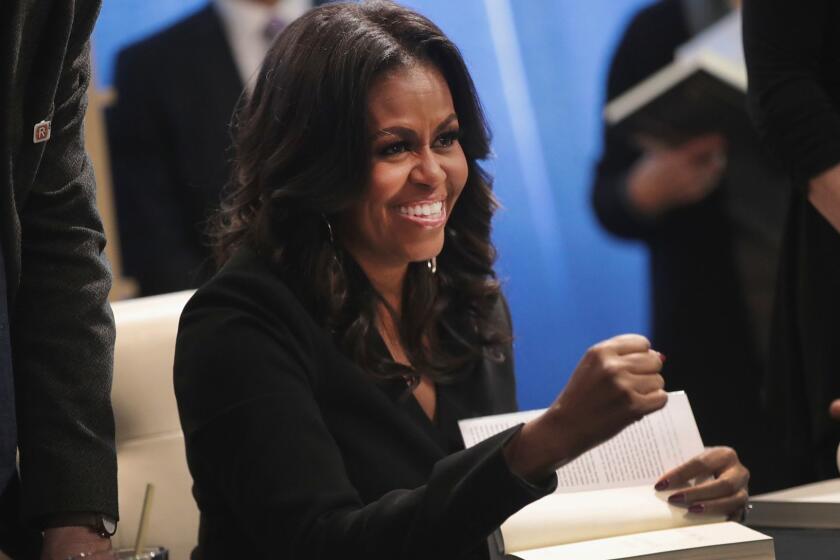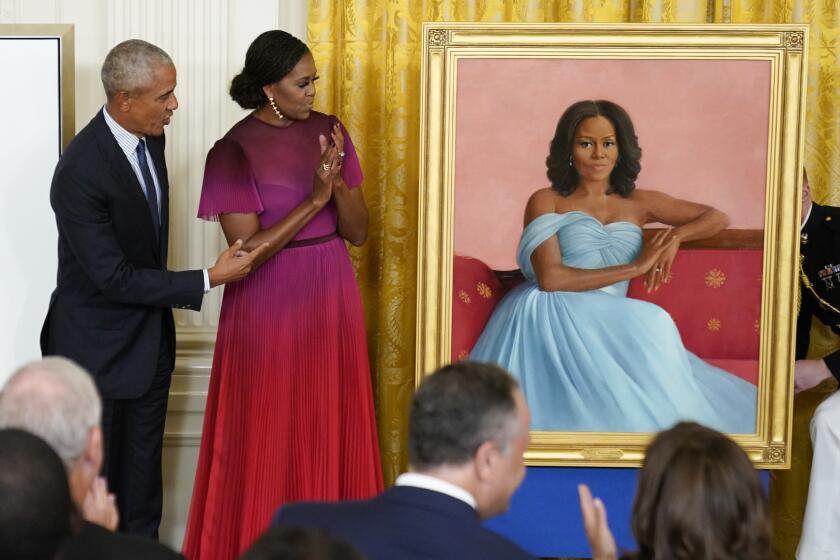Michelle Obama’s new book is self-help — but it goes high

- Share via
Review
The Light We Carry: Overcoming in Uncertain Times
By Michelle Obama
Crown: 336 pages, $33
If you buy books linked on our site, The Times may earn a commission from Bookshop.org, whose fees support independent bookstores.
It should be easy to write off “The Light We Carry,” by former First Lady Michelle Obama — with its toolbox framework, motivational one-liners and inspirational quotes from Toni Morrison, John Lewis and Maya Angelou — as a clichéd self-help manual, an easy holiday-season layup after putting in the hard work on her mega-bestselling memoir, “Becoming.” Among the reasons it’s not so easy to dismiss are the indefatigable humility of its author and, perhaps more importantly, the resolute necessity of a book like this right now, in this particular moment, for a pandemic-afflicted nation that is politically siloed, socially untethered, emotionally shell-shocked.
Divided, like her memoir, into three parts, “The Light We Carry” is both personal and practical. Obama reflects on her experiences not just as a public figure but as a daughter, friend, mother and partner, weaving together small yet detailed anecdotes with larger life messages in an effort to remind us “that self-worth comes wrapped in vulnerability, and that what we share as humans on this earth is the impulse to strive for better, always and no matter what.” If “Becoming” was about, well, becoming, its follow-up is about Obama committing even more deeply to the person she has become. “Maybe more than I ever had,” she writes in this book’s introduction, reflecting on her speech at the 2020 Democratic National Convention, “I’d experienced the kind of volcanic clarity that comes when you speak from the absolute center of your being.”
In the opening chapter, “The Power of Small,” Obama’s discovery of knitting as a way to quiet her anxiety is relatable and charming, but it’s her simultaneously set and blooming self-awareness that appeals — here and throughout the book. “I was never one for hobbies,” she writes, before sharing that knitting is, in fact, in her DNA. “According to my mother, every woman on her side of the family learned how to work a needle and thread, to sew, crochet, and knit.”
As Obama acknowledges, such nimbleness with needle and thread was, for Black women throughout American history, more often born of economic necessity than developed as a hobby. The seamstresses in Obama’s lineage worked for white families, making and fixing and darning their clothes. It’s a perfect way to start the book, because it’s not just about the “enforced stillness” that knitting affords Obama but also about the act of reaching back through history to knit and purl ancestral memory into her yarn-in-progress.
James Baldwin wrote, “No one can possibly know what is about to happen: it is happening, each time, for the first time, for the only time.”
This is the overarching theme of “The Light We Carry” — the narrative weave that each of us constructs from our own spindly threads of observation, shaped in part by the plain and tender truths of those who came before us. Not only our biological ancestors, but our human ancestors. We’re all in this together, Obama is saying. Which again may sound a bit cliché, but I for one am very happy to be reminded of this fact, especially if it comes with some choice anecdotes. I don’t mind it when Obama uses the story of a 29-year-old Lin Manuel Miranda overcoming his fears to perform a newly written song from a fledgling “Hamilton” at the White House to demonstrate the following point: “The fearful mind loves to show up at moments of peak stress, and with a clear agenda: It wants to veto everything. It is not at all down with your twirl.”

I don’t mind it when she enlists her college friend Angela, “a fast-talking kid from D.C. with a ferocious intellect and the preppiest wardrobe I’d ever seen,” to help emphasize the importance of cultivating friendships with folks you might not feel immediately aligned with. Or when she uses the comedian Ali Wong to convey the power of bringing your whole self to things, as when this petite Asian American woman filmed her 2016 raunchy standup comedy special, “Baby Cobra,” while seven and a half months pregnant.
As in her first book, Obama’s writing is most free when she’s talking about the love of her life, Barack. In a chapter titled “Partnering Well,” she writes, “Our marriage is what we launch from and land in, a place where we can each be thoroughly, comfortably, annoyingly ourselves.” It’s a joy to read about her love for someone whom we, the public — but especially Black folks — have loved too, and yet in such a different capacity. And to get relationship advice from someone who explains, “The only love story I know is the one I happen to live inside every day.” When the other half of that love story is someone we know (or think we know) so vividly, it’s kind of titillating to read that his “candor and certainty” are “sexy as hell.”
After President Biden and former President Obama speak, former First Lady Michelle Obama reflects on the ceremony’s meaning and the state of a country in turmoil.
Toward the end of “The Light We Carry,” Obama writes about how paradoxical the human experience can be. She describes lying next to her daughters at bedtime when they were little. “I’d watch them drift off to sleep, their lips parted, the arcs of their little chests rising and falling beneath the sheets, and feel struck by the realization that no matter how much I tried, I’d never know even half their thoughts. We’re alone, each one of us. That’s the ache of being human.”
It’s a moment at once personal and existential, but right now it also feels strikingly pointed. In our loneliness, especially during the pandemic, we reached out to become less unknowable via social media, only to watch helplessly as one platform, a source of Black culture, joy and livelihood in particular, falls at the hands of a white male billionaire. We are seeing how tenuous such connections can be — and conversely how much humanity consists of and relies on their cumulative impact.
This recognition is Obama’s bass note, the ballast in her book of lessons. After all she has witnessed and experienced, both as a first lady and as a Black woman in America, she knows in her bones just how timely these themes of unity, compassion, gratitude, courage and the desire to see one another are: “Any time we grip hands with another soul and recognize some piece of their story they’re trying to tell, we are acknowledging and affirming two truths: We’re lonely and yet we’re not alone.”
And for those who are surely wondering: Yes, she does address the now-famous catchphrase from her speech while campaigning for Hilary Clinton at the 2016 Democratic National Convention. In fact, she gives it a whole chapter—the last chapter in the book, called “Going High,” in which Obama somehow manages to tie everything up in a bow that is neither neat nor messy but, rather, tidily handmade.
Michelle Obama made just the right impassioned plea for Joe Biden during strange first night of convention
Carroll is a cultural critic, podcast host and editor at large at the Meteor.
More to Read
Sign up for our Book Club newsletter
Get the latest news, events and more from the Los Angeles Times Book Club, and help us get L.A. reading and talking.
You may occasionally receive promotional content from the Los Angeles Times.









